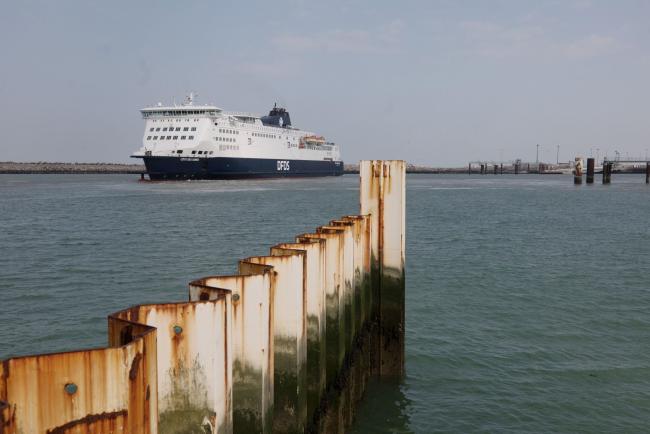(Bloomberg) -- If the past three years of Brexit have been difficult and intense, the next 11 months threaten to be even more so. The U.K. and European Union are already at odds before they even start thrashing out the terms of their future relationship.
British Prime Minister Boris Johnson views Brexit as an opportunity to break free from what he sees as the EU’s restrictive rules. But EU negotiators are wary of a potential competitor on their doorstep. As European Commission President Ursula von der Leyen warned this month, the U.K.’s future access to the single market depends on how far Johnson agrees to abide by the bloc’s rules.
Reaching a compromise will be difficult and, in private, EU officials warn that there will be bad blood. Johnson’s decision to rule out extending the transition period -- which keeps Britain locked into the EU’s rules until the end of 2020 -- means negotiators will have to prioritize the most important elements of a future trade deal over the coming year. Other agreements could follow later.
At the heart of the deal will be a free-trade agreement that allows the flow of goods between the two territories without tariffs or quotas. But that’s only a small part of the story. Here’s a summary of the most important of the EU’s positions, as set out in official documents and interviews with officials in Brussels.
Standards
Arching over all of the EU’s demands is what the bloc calls the “level-playing field.” The intention is to stop the U.K. undercutting the EU to gain an economic advantage. The bloc wants London to continue applying EU state-aid restrictions, preventing it from offering assistance to companies that would be deemed anti-competitive under EU rules.
In other areas, such as environmental protection and taxation, the EU wants the U.K. to remain in lockstep. Brussels wants Johnson to agree to “non-regression” -- in other words, not to row back from the bloc’s existing environmental-protection, employment and labor laws. The EU also wants the U.K. to commit to toughen some of its labor and environmental standards if the EU decides to do so in future.
The U.K. is likely to oppose all this aggressively. Johnson fought his election campaign on the basis that the country would be free from EU rules. This battle is likely to define the next chapter of negotiations.
A fight over fishing waters is almost certain to be the big early row. The EU wants to maintain “reciprocal access to fishing waters and resources” -- and says the entire future relationship depends on getting a deal here. Both sides have pledged to try to do this before July, but they are so far apart it won’t be easy.
As an EU member, the U.K. has had to share its fish stocks with other EU nations, something British fishermen have long complained about. Campaigners say boats from other EU countries take almost 60% of fish caught in British waters. Johnson has vowed to regain control of those waters after Brexit.
The U.K. has a strong card here because boats from other countries, particularly France, are dependent on access to British waters. President Emmanuel Macron has been pushing the EU to seek concessions so that French coastal communities aren’t affected.
Financial services
Von der Leyen has warned everything will change for the City of London once Britain leaves the EU. Firms will no longer have a passport to offer their services across the bloc. Instead, access will depend on the EU being satisfied that U.K. rules are equivalent to its own.
You can read more on equivalence and what it means for London here.
The EU says any equivalence decisions will be unilateral and discretionary. That’s a problem for the U.K. because Brussels could decide to deny firms access to the single market with only limited notice.
Both sides have said they will try to have equivalence assessments, of which there are about 40, in place by July. “In all cases,” the EU will “maintain its regulatory and decision-making autonomy,” the European Commission said in its presentation to member-state diplomats on the issue.
Security
Both sides see security cooperation as a priority. Because the subject is less entwined with the Free Trade Agreement, a deal may be easier to reach, according to EU officials.
“We must ensure that we continue to work together on upholding peace and security in Europe and around the world,” von der Leyen said in London. “We must build a new, comprehensive security partnership to fight cross-border threats ranging from terrorism to cyber-security to counter-intelligence.”
Data protection
The two sides need to clinch an agreement that will allow organizations to freely move data about customers to and from the EU without breaching data protection rules. A so-called adequacy decision would add the U.K. to a list of countries whose data laws are accepted as being equivalent to Europe’s own.
The EU wants the U.K. to agree to stick to European standards. A less stringent agreement would be more complex to implement, the EU says.
According to the commission’s presentation on the issue, the “intended depth of future partnership with the U.K. in law enforcement and judicial cooperation in criminal matters would be facilitated by an adequacy decision.”
Transport
The EU wants an agreement that ensures connectivity, but doesn’t give the U.K. full access to the bloc’s single aviation market. The two sides also need to find agreement on access to each other’s road haulage markets. As is the case on most issues, the EU’s position is that “U.K. operators can no longer have the same access rights as a member state operator.”
Energy
Electricity and gas supply will also come up for discussion. Here, the EU wants non-discriminatory access to networks, level-playing field guarantees, independent regulation, as well as bans on import and export restrictions and dual pricing.
